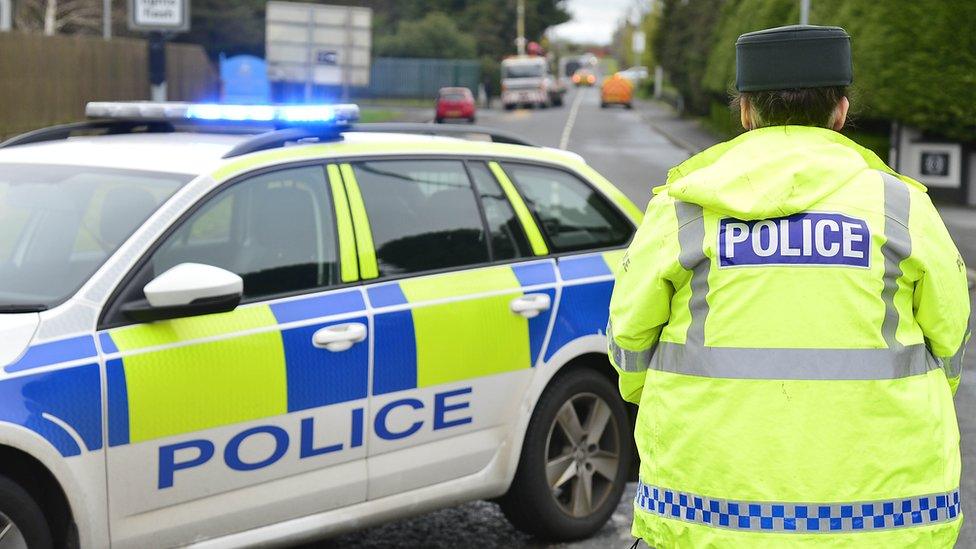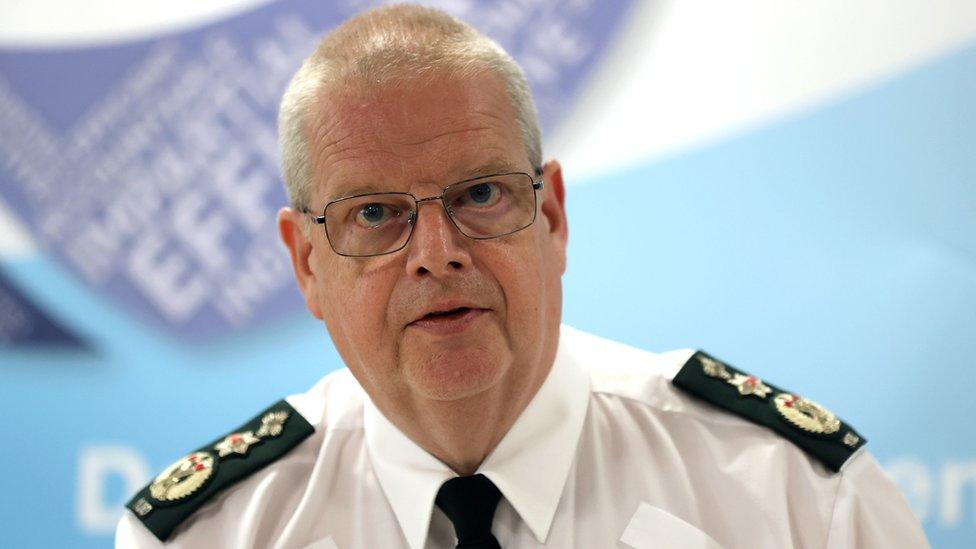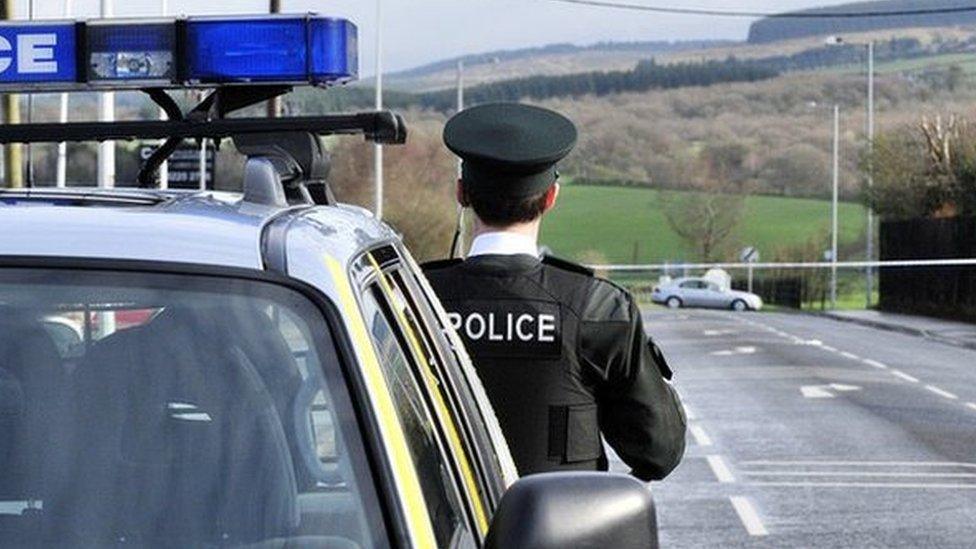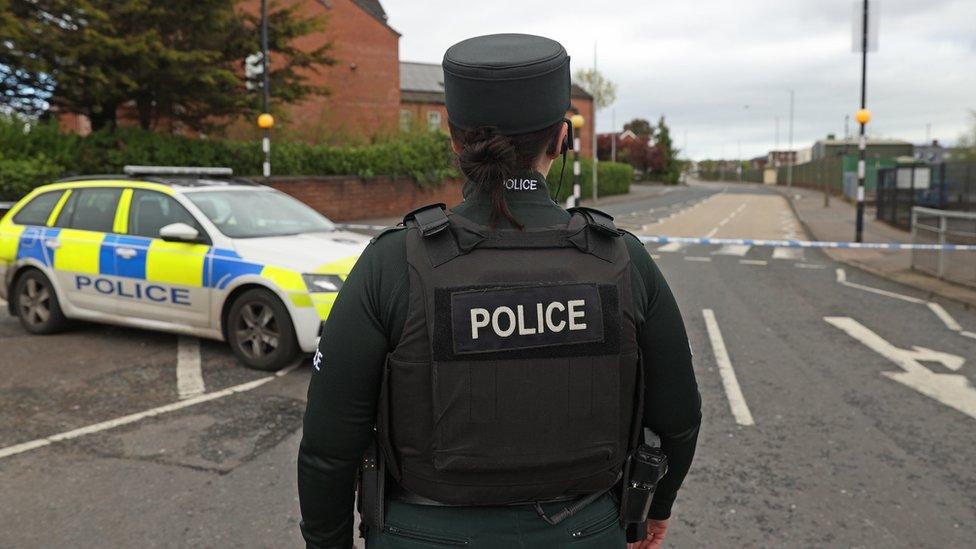PSNI data breach: Civilian worker 'no longer feels safe in home'
- Published

A support worker with the Police Service of Northern Ireland (PSNI) has said he does not feel safe in his home following a massive data breach.
The man said he had made changes to his daily life and no longer attended his child's Gaelic football training.
His name was on a document mistakenly shared by the PSNI that gave details of about 10,000 officers and staff.
He said it had "raised security concerns" and caused "sleepless nights".
Some 1,700 staff have reported concerns with police since the data was leaked.
The worker, who is based outside Belfast, said that many of his colleagues were in "extreme panic", especially those with unique surnames.
Many of whom, he added, "are no longer travelling to work in their own vehicles. They're maybe taking their partner's, their mum's, a close family relative, and varying which car to travel to work in on a daily basis".
He also said that since the breach many have changed their names on social media or deleted their accounts entirely.
The chief constable has apologised for what he called an "industrial-scale" breach of internal data.
The details included the surname and first initial of every employee, their rank or grade, where they are based and the unit they work in, including sensitive areas such as surveillance and intelligence.
A number of PSNI employees have spoken anonymously to BBC News NI about their safety fears following the data breach.
The civilian staff member said that prior to the leak he had taken steps to conceal his profession.

Police in Northern Ireland are very conscious of their personal security
"I would wear a uniform with the PSNI emblem on it," the support worker said.
"When I wash the clothing, I wouldn't be hanging it out on the line like the rest of my clothes, it would be taken to another location and washed and dried or tumble dried or left in the house over the radiator just to ensure that I don't leave with anything, with any emblems on me.
"There were places before that I was going to and there was people that I would have been in general contact with that would have had suspicions at times that I was an employee of the police service," the man told BBC News NI.
"So it has changed my attendance at a local sports club that I have been attending for maybe 10 or 15 years - or going to a club that my child would also be attending. I've varied my attendance at things I have been doing regularly for years."
Compensation
Law firms are already making it known that they will represent officers and civilian staff who have had their identities revealed in these data breaches.
As of Monday morning, 2,834 police officers had signed up to take legal action after the data breaches, according to the Police Federation.
With more than 10,000 people affected, the potential bill for compensation could run to tens of millions of pounds, according to BBC NI's home affairs correspondent, Julian O'Neill.
In March, the terrorist threat level in Northern Ireland was raised from substantial to severe, meaning an attack is highly likely.
It followed an attack on an off-duty senior detective, who suffered life-changing injuries after being shot several times by dissident republican paramilitaries.
The civilian worker said the data breach had "brought on a level of panic that hasn't been around in a lot of years".
"It's giving my partner issues as well. She has concerns and is now extremely panicked about me going to work. It has raised the security concerns, I suppose, that were never fully away. There have been a few sleepless nights.
"With my details being leaked out on this, I'm unsure who has had access to it. I think that although not easily identifiable, a couple of key pieces of information could lead [to people] realising that those details are mine."

Chief Constable Simon Byrne has apologised for what he called a breach on an "industrial scale"
The civilian worker pointed out that support staff only receive about £500 in so-called danger money - while an officer can get up to £3,500.
He also said he knows of two PSNI employees actively seeking new employment directly because of the breach.
Meanwhile, it emerged on Saturday that 200 PSNI officers and staff of the Police Service of Northern Ireland were not informed of the theft of personal data from a superintendent's car for a month.
This was in relation to another data breach in Newtownabbey in July.
The Superintendents' Association of Northern Ireland (SANI) confirmed one of its members was involved, adding that it was giving them "every possible support in this difficult situation".
- Published12 August 2023

- Published9 August 2023

- Published8 August 2023
